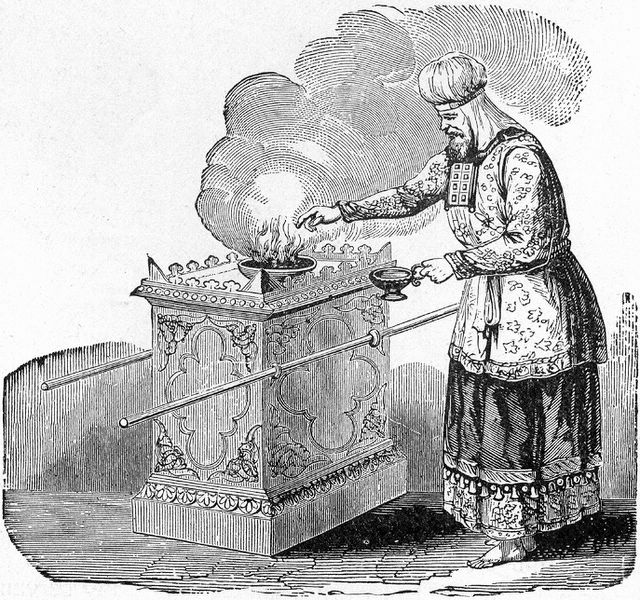Messianic Jews were mentioned in several major media outlets in the past week.
New York Times
Today, the app contains everything from the New International Version to “The Message,” an ultramodern interpretation that reads like a juicy novel. It also includes the so-called Orthodox Jewish Bible, which was actually developed for a religious sect known as Messianic Jews, who believe that Jesus is the Messiah that the Jews await.
 |
| Photo credit: New York Times. |
From the caption for the above image: "the Orthodox Jewish Bible...created by the Artists for Israel International Messianic Bible Society...incorporates Yiddish and Hasidic cultural expressions into an English translation of both the Old and New Testaments."
The
Orthodox Jewish Bible is certainly among the Messianic movement's more idiosyncratic translations (which is saying a lot). This fit right into the article's emphasis on the wide range of different Bible translations available through YouVersion. That said, the two other major Messianic Jewish translations, the
Complete Jewish Bible and the
Tree of Life version, are also available through YouVersion.
Christianity Today

Christianity Today's recent issue on Leviticus mentions Messianic Jews in two of its cover stories. In
Learning to Love Leviticus, Christopher J. H. Wright explains how Christians can treat biblical "as a paradigm or model for our personal and social ethics in all kinds of areas: economic, familial, political, judicial, sexual, and so on"...without "upholding all the jots and tittles." In a paragraph on the food laws, he writes:
The distinction between clean and unclean animals and foods was symbolic of the distinction between Israel as God's holy people and the Gentile nations (Lev. 20:25–26). In the New Testament, that separation is abolished in Christ, as Paul says in Ephesians 2. Through the Cross, God has made the two cultures one new humanity. And as Peter discovered through his vision in Acts 10, before going to the home of the Gentile Cornelius, what God has called clean should no longer be called unclean. Today some Messianic Jewish believers choose freely to observe the kashrut regulations as a mark of their Jewish community and cultural identity. But in their unity, believers are free from food laws.
Kudos to Wright for not ignoring the existence of Messianic Jews in the body of Messiah who observe the
kashrut regulations of Leviticus. That being said, I found his claim confusing. Are the
kashrut restrictions truly disruptive to unity? (In most Messianic Jewish synagogues I've visited, Jews and Gentiles experience free fellowship over kosher meals.) Furthermore, in conflicts over food between "stronger" and "weaker" brethren, didn't Paul instruct the strong to compromise for the sake of the weak? (This particular line of argumentation assumes that Messianic Jews observing
kashrut would be identified with the weak. I myself don't necessarily read the passage that way, but perhaps Wright or those who agree with him do.)
The argument against the food laws from unity strikes me as rather weak on its own. In fact, I suspect that other theological convictions (such as the abrogation of the law in Christ or the supposed dangers of law observance) are really behind this argument, lending it support in the minds of those who accept it. Perhaps as
post-supersessionist interpretation of the New Testament gains traction among contemporary scholars, Wright will find this reading of Acts 10 (and other related passages) challenged.
~
Readers who found Wright's comments on Messianic Jews rather uninformed may find much more to appreciate in Philip Cary's
Gentiles in the Hands of a Genocidal God. Cary's thesis is that reawakening an awareness of the theological and historical significance of Gentile identity can significantly transform Christian perspectives on the Old Testament's troubling genocide passages. Christians tend to identify too much with Israel, Cary contends, to the point where they forget their place in the narrative. "We have been reading Israel's Scriptures so long that we forget that these words were not originally addressed to us.":
In fact, with respect to the command to exterminate the Canaanites, our position is less like Israel's and more like that of Rahab, the Canaanite prostitute in Jericho who befriends the Israelite spies. She has not taken part in Israel's exodus, but she has heard of it and believes it. She knows the name of the Lord, the God who has given the land to Israel, and she confesses that he is God of heaven and earth (Josh. 2:9–11). She is a believer, and eventually will be included in Hebrews 11's great litany of heroes who lived by faith. But she is not an Israelite. She is a Canaanite who hopes to live, not die.
As a believer, Rahab can have hope, because the threat she faces is not so much moral as religious. It is not as if the Israelites were so much more righteous than every other nation (Deut. 9:4–6). Israel is holy not because of their own righteousness but because the Lord loves them and chose them as his people. And the holiness of the Lord is a kind of jealousy that claims Israel as his own, not allowing other nations to lead them into worshiping false gods (7:5–8). That is the holiness that leads to herem, the extermination of Rahab's people for their idolatry.
My proposal is that to read this story properly, as Gentiles, is to put ourselves in Rahab's place. Our origin lies not with the people who hear the command to kill, but with those who are to be killed. We belong with those who should be devoted to destruction because we offend against the holiness of God. And yet what has actually happened is that, like Rahab, we have received mercy through faith in the God of Israel.
To read the Canaanite genocide this way is to have our hearts formed the way the New Testament intends for Gentiles.
I'm sure I wasn't the only one shocked to find this in Christianity Today. (For anyone troubled by the "fire and brimstone" tone of the above passage, make sure to read the whole article; Cary also discusses the beautiful consequences of identifying with Rahab, i.e. "You could say that what frees Rahab from herem is hesed, the lovingkindness of her relationship with Israel.")
Before concluding the article, Cary discusses to the historical relationship between Gentile Christians and Israel:
"In you all the families of the earth shall be blessed" (Gen. 12:3, esv)...Christ himself fulfills these words, making the blessing of Abraham into a blessing for all who believe.
Because of this gospel blessing, we can hear "I am the Lord your God" as words addressed to us, since we too share the faith of Abraham. But notice what this commits us to. It means we Gentile believers in Christ are to be a blessing to the people of Israel, "that by the mercy shown to you they also may now receive mercy," as Paul says (Rom. 11:31, esv).
Alas, what sort of blessing have Gentile Christians been to Israel? So much persecution of the Jews fills our history. Even our evangelism has often meant attempting to put an end to them. As Messianic Jews have recently pointed out, that is what Christians did by demanding that Jews who accept Christ must cease to practice Judaism—in effect ceasing to be Jews. It meant turning them away from their covenant with the God of Abraham and Moses, as if we had forgotten that this was none other than the God and Father of our Lord Jesus Christ.
Here Cary demonstrates familiarity with the central claims in Messianic Jewish thought--the unity of Jewish identity and Jewish practice, the validity of "Judaism," the deep flaws in the historic Christiant "gospel" of "Jesus, not Judaism." (Readers who find merit in Cary's insights here may want to check out
his Jonah commentary before Yom Kippur.)
~
One other article in CT which may be of interest to Messianic readers is Daniel Harrell's account of
The 30-day Leviticus Challenge his church did. I was half-expecting a conclusion like this: "After a whole month of these tedious and difficult laws, we were all more grateful for God's grace which sets us free from the law." Sure enough, Harrell set up a conclusion remarkably similar to this...and then elegantly debunked it:
But if reading Leviticus only succeeds in making you feel bad for being a lousy Christian, you've missed its point. Leviticus isn't in the Bible merely to show you your need for grace. It's in the Bible to show you what grace is for. The ancient Israelites were already chosen people before God gave them the Law. The Law's purpose was never to save anybody. Rather, its purpose was to show saved people how to live a saved life.
Reading on, I was also impressed by the transformations Harrell described in the lives of the Challenge participants: continued Sabbath practice, the conclusion that confession of sin is the "modern, post-Jesus equivalent" of sacrifices, and a congregational "Day of Atonement" (during Lent), of which he wrote:
Many left with similar feelings of walking on air—as well as intentions to be more grounded in God—which is precisely what grace (and the Law) are supposed to do. I couldn't help but wonder why we tend to view obedience as so burdensome. Could it be that we've never really obeyed?
Sounds like a pretty decent Day of Atonement to me.
HT Glenn for the tip about the Cary article.























